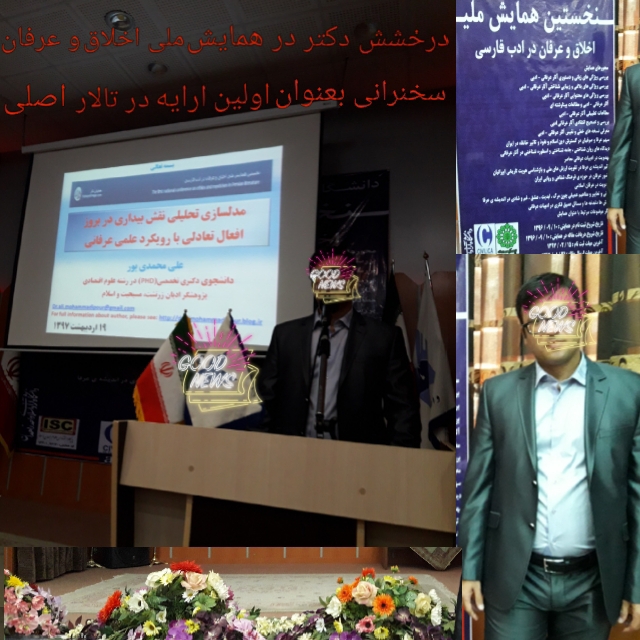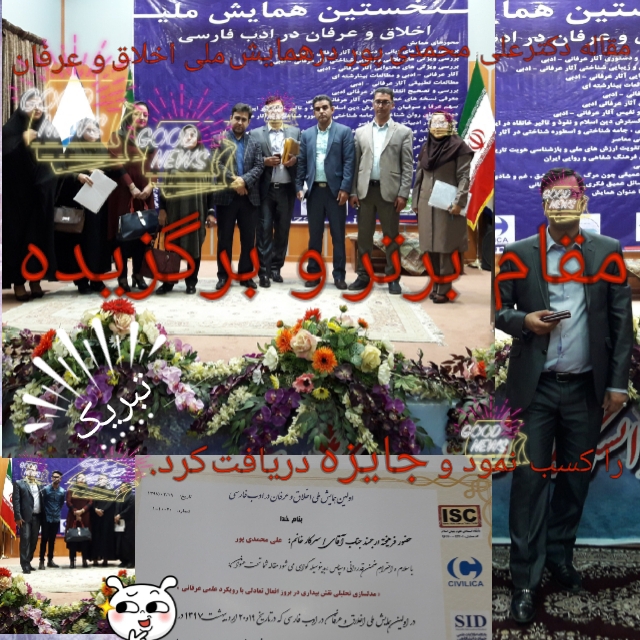ذیلاً بخشی از سخنرانی جناب آقای دکتر علی
محمدی پور با عنوان " Analyze of
intelligence (IQ, EQ or SQ) and classify different personalities " که محور اصلی سخنرانی ایشان در قالب
ارائه تعاریف پایه ای IQ، EQ، SQ و
مولفه های اساسی آنها، به همراه تفکیک الگوهای شخصی متنوع در قالب نظریات تئوریکی
مربوطه و قابل کلاسه بندی میباشد. همچنین تحلیل راهکارهای ارتقاء هر کدام از
الگوهای شخصیتی تعریف شده در الگوها در ادامه مباحث وی بیان گردیده و نهایتاً
مباحث ارزشمند تفکیک شخصیت افراد در الگوی چپ مغزی، راستی مغزی و یا کارآفرین تحلیل
می گردد. همانگونه که مستحضرید با استفاده از آزمون های تخصصی و سنجش الگوهای
رفتاری کارکرد مغزی افراد میتوان اشخاص متعدد را در قالب قدرت نسبی بخش راست و یا
چپ مغزی وی بصورت نسبی دسته بندی نمود. خاطر نشان می گردد این مباحث و تست های
عملکردی نسبی مغز، نه تنها علمی تحلیلی بوده، بلکه در آزمون مصاحبه دکتری تخصصی
علوم رفتاری و بویژه رشته های متنوع روانشناسی، مورد توجه اساسی مصاحبه کنندگان
تخصصی میباشند.
Subject:
"Analyze of intelligence (IQ, EQ or SQ) and classify different
personalities"
Dr. Ali
Mohammadipour
Introducing
A
good indicator of success in the past has been the level of one's intelligence.
It was assumed that the relationship between one's IQ and one's success would
be positively correlated.
However,
what about "book smarts vs. street smarts?
" Can an individual with an
average IQ be more successful than an IQ genius?
"It is not the strongest of the
species that survives, nor the most intelligent, but the one most responsive to
change." - Charles Darwin
IQ
will get you through school, but EQ gets you through life.
IQ – Intelligence Quotient
A
number that signifies the relative intelligence of a person; the ratio
multiplied by 100 of the mental age as reported on a standardized test to the
chronological age.
IQ
is primarily used to measure one's cognitive abilities, such as the ability to
learn or understand new situations; how to reason through a given
problem/scenario; the ability to apply knowledge to one's current situations.
Over
140 - Genius or almost genius
120
- 140 - Very superior intelligence (Gifted)
110 - 119 - Superior intelligence
90 - 109 - Average or normal
intelligence
80 - 89 - Dullness
70 - 79 - Borderline deficiency in
intelligence
Under
70 - Feeble-mindedness
EQ – Emotional Quotient
In mid-1990s, Daniel Goleman revealed findings in neuroscience and
psychology that stressed the importance of Emotional Quotient (EQ).
Emotional intelligence (EI) is an ability, skill or, in the case of the trait
EI model, a self-perceived
ability to identify, assess, and control the emotions of oneself, of others, and of groups. Various
models and definitions have been proposed of which the ability and trait EI models are
the most widely accepted
in the scientific literature.
Criticisms have
centered on whether the construct is a real intelligence and whether it has incremental
validity over IQ and the Big Five personality dimensions
Examples by comparison of EQ vs. IQ:
-Appealing to emotions to convince someone rather than using facts
alone
-Using your emotions in
addition to your cognitive abilities to function rather than relying solely on
logic
-Knowing how and why vs. Knowing what
-Knowing how to motivate separate individuals
as opposed to treating everyone the same way
-Understanding and controlling your emotions
to use them for something vs. Letting your emotions control you because you do
not know how to deal with them.
The Components
of EQ
Emotional intelligence is measured using 5-major components and
15-subcomponents:
1. Intrapersonal Skills (ability to understand and apply personal
emotions)
* Self Regard (ability to accept oneself as basically good)
* Emotional Self Awareness (ability to recognize one's own
feelings, which allows us to manage them and make better decisions. It is
important to be positive even when challenged because it results in more
focused thinking)
* Assertiveness (ability to express feelings,
beliefs, and thoughts without becoming antagonistic and uncooperative towards
others)
* Independence (ability to be self-directed
and self-controlled in ones thinking and actions and to be free of emotional
dependency)
* Self Actualization (ability to realizes
one's potential)
2. Interpersonal Skills (people skills)
* Empathy (understanding the feelings of others, which enables us
to respond appropriately to changes in the emotional climate of others;
Significant others, take note)
* Social Responsibility (being a cooperative, contributing, and
constructive member of various social groups)
* Interpersonal Relationships (ability to
establish and maintain mutually beneficial relationships noted for their
intimacy and by the giving & receiving of affection, whether it be as a
lover, friend, family member, or loyal employee)
3. Stress Management (ability to handle challenges)
* Stress Tolerance (Ability to handle difficult situations without
‘falling apart')
* Impulse Control (ability to resist or delay an impulse, drive, or
temptation to act; controlling the need for "instant gratification")
An Impulse is a sudden desire to do something
4. Adaptability (Ability to react quickly, appropriately, and
efficiently to change)
* Reality Testing (ability to assess the correspondence between
what is experienced and what objectively exists; knowing what you want to do
vs. what you actually can do)
* Flexibility (ability to adjust one's emotions, thoughts, and
behaviors to changing situations and conditions)
* Problem Solving (ability to identify and
define problems as well as to generate and implement potentially effective
solutions)
5. General Mood
* Optimism
* Happiness
Right
vs. Left Brain in Education System
This theory of
the structure and functions of the mind suggests that the two different sides
of the brain control two different “modes” of thinking. It also suggests that
each of us prefers one mode over the other.
Discussion
Experimentation
has shown that the two different sides, or hemispheres, of the brain are
responsible for different manners of thinking. The following table illustrates
the differences between left-brain
and right-brain thinking:
|
Right Brain
|
|
Left Brain
|
|
Random Intuitive
Holistic Synthesizing
Subjective
Looks at wholes
|
Logical Sequential
Rational
Analytical
Objective
Looks at parts
|
Most individuals have a distinct preference for one of these styles of thinking. Some, however, are
more whole-brained and equally adept at both modes.
Left-brain scholastic subjects focus on logical thinking, analysis,
and accuracy. Right-brained subjects, on the other hand, focus on aesthetics,
feeling, and creativity.
Learning Styles, Culture & Hemispheric Dominance
A. Hilliard describes "learning style". An important
factor in understanding learning styles is understanding brain functioning.
Both sides of the brain can reason, but by different strategies. and one side
may be dominant.
A successive processor (left brain) prefers to learn in a
step-by-step sequential format, beginning with details leading to a conceptual
understanding of a skill. A simultaneous processor ( right brain) prefers to
learn beginning with the general concept and then going on to specifics.
Which Type of
Learner Are You ?
|
RIGHT (Global)
|
LEFT (Analytic)
|
|
Simultaneous Hemispheric Style
|
Successive Hemispheric Style
|
|
1. Visual
|
1. Verbal
|
|
2. Responds to tone of voice
|
2. Responds to word meaning
|
|
3. Random
|
3. Sequential
|
|
4. Processes information in varied order
|
4. Processes information linearly
|
|
5. Responds to emotion
|
5. Responds to logic
|
|
6. Impulsive
|
6. Plans ahead
|
|
7. Recalls people's faces
|
7. Recalls people's names
|
|
8. Gestures when speaking
|
8. Speaks with few gestures
|
|
9. Less punctual
|
9. Punctual
|
|
10. Prefers sound/music background while
studying
|
10. Prefers formal study design
|
|
11. Prefers frequent mobility while
studying
|
11. Prefers bright lights while studying
|
Right vs. Left
Brain as a Conclusion
|
RIGHT Side of Brain
|
LEFT Side of Brain
|
|
Focus of modes, voice & illustrations
|
Focus of meaning & mathematical mode
|
|
Emotions & Affections
|
Demonstrational & Logical
|
|
Imaginations & Dreaming
|
Experimental & trial and error modeling
|
|
Meta Physical analyses
|
Physical analyses
|
|
Artist or Lyrist(Poet)
|
Calculations & Measurement
|
|
Time worker
|
Self-centered
|
|
Multi worker
|
Linear Operating
|
|
Management
|
Planning
|
|
Inventing base on the innovation & Dream
|
Inventing base on the Scientific rules
|
SQ - Spiritual
Quotient
Dana Zohar and Ian Marshall introduced a new dimension to human
intelligence. Spiritual Quotient (or SQ) is the ultimate intelligence, they
claim. This is the intelligence used to solve problems of meaning and value.
The transformative power of SQ distinguishes it from IQ and EQ. IQ
primarily solves logical problems. EQ allows us to judge the situation we are
in and behave appropriately. SQ allows us to ask if we want to be in that
situation in the first place. It might motivate us to create a new one. SQ has
little connection to formal religion. Atheists and humanists may have high SQ
while someone actively religious may not.
While IQ allows us to think and EQ helps us relate, SQ allows us to
do both these things during times of rapid change. IQ & EQ were sufficient in
a relatively static world. SQ provides the linkage in times of paradigm shift
and chaos.
EIGHT
SIGNS OF HIGH SQ
1.Flexibility
2. Self-awareness
3. An ability to face and use suffering
4. The ability to be inspired by a vision
5. An ability to see connections between diverse things (thinking
holistically)
6. A desire and capacity to cause as little harm as possible
7. A tendency to probe and ask fundamental questions
8. An ability to work against convention
Six personality
type
J.L. Holland divided people into six personality types (take the
test) and devised tests to determine one's type, or the mix.
1. CONVENTIONAL TYPE: THE PATH OF DUTY
We follow this path by serving the community. This is done by
realizing our life's purpose and following it with full commitment. We have the
interest of humanity in mind and pursue what we truly love for others' sake.
Many of us may want to associate ourselves with a specific organization to
fulfill this ambition.
Whatever outlet we choose, we must avoid two common mistakes that people on
this path make. Avoid becoming narcissistic. It is an easy trap to slip into.
At one point we may withdraw completely from relationships and focus only on
ourselves. Behaviors associated with such self-absorption include lying in bed
late, heavy drinking and smoking and overindulgence in food and sex. A
narcissist must address his problems adequately through therapy or spiritual
practices before he can progress on the path of duty.
Avoid extreme identification with your group and its uncritical championing. We
must realize that there is a place in the world for groups whose values differ
from ours.
2.SOCIAL TYPE: THE PATH OF NURTURING
3.INVESTIGATIVE TYPE: THE PATH OF KNOWLEDGE
4.ARTISTIC TYPE: THE PATH OF PERSONAL
TRANSFORMATION
5.REALISTIC PERSON: THE PATH OF BROTHERHOOD
6.ENTERPRISING TYPE: THE PATH OF
SERVANT-LEADERSHIP
SEVEN TYPES OF
INTELLIGENCE
With the
popularity of EQ and SQ in recent years, it might be worth remembering an older
way of conceiving intelligence, which helps cultivate individual aspects of
ourselves. This is Howard Gardner's theory of Multiple Intelligence. In 1984,
in his book Frames of Mind—The Theory of Multiple Intelligences, he offered a
critique of IQ testing and suggested that what we possess is not one
'intelligence' but seven different intelligences. These are:
logical-mathematical, linguistic, musical, bodily kinesthetic, interpersonal,
intrapersonal and spatial.
|
Intelligence
Type:
|
How
To Develop It:
|
|
Logical-Mathematical
Intelligence
This is what we use to manipulate concepts and arrange them into meaningful
patterns. We develop this by constantly confronting objects, assessing them
and reordering them.
|
1.
Learn a computer language
2. Work on logic puzzles
3. Identify scientific principles around the house: pumps, bulbs etc.
|
|
Linguistic
Intelligence
This is the intelligence that gives us sensitivity to language, an ability to
absorb and manipulate it skillfully and to be aware of shades of meaning.
|
1.Take
a writing class
2. Record yourself speaking into a tape-recorder
3. Memorize passages of poetry
|
|
Musical
Intelligence
This gives us our sensitivity to sound, our ability to arrange sounds into
patterns pleasing to the human ear.
|
1.
Sing in the shower
2. Memorize tunes
3. Spend time listening to music everyday
|
|
Bodily-Kinesthetic
Intelligence
This is the intelligence that gives us the ability to perform tasks of great
discipline and commitment with our bodies. Dancers, athletes and martial arts
practitioners have this.
|
1.
Take up martial arts like tai chi or karate
2. Take up a sport
3. Learn a craft such as woodworking or crochet
|
|
Interpersonal
Intelligence
This gives us the ability to relate skillfully with others, to be aware of
our feelings and the other person's, to see where the other person is coming
from.
|
1.Decide
to meet one new person a week and stay in touch.
2. Join an NGO
3. Spend 15 minutes a day listening actively to a friend.
|
|
Intrapersonal
Intelligence
This is about becoming truly aware of ourselves and having the ability to
constantly purify ourselves in order to access higher levels of joy and
power.
|
1.
Do a vipassana course and make it a part of your life
2. Spend time with yourself everyday, just being quiet
3. Read biographies of people with powerful personalities
|
|
Spatial
Intelligence
This form of intelligence calls upon our ability to create a mental image. It
gives us the capacity to perceive the visual world accurately and to perform
transformations and modifications upon our initial perceptions. Artists,
designers and architects have this intelligence.
|
1.
Take classes in painting, sculpture or photography
2. Buy a graphics software program and create designs on the computer
3. Watch films with attention to lighting, camera angles, color and other
aspects of cinema
|
vipassana course: vipassana which means to see
things as they really are, is one of India's most ancient techniques of
meditation...




